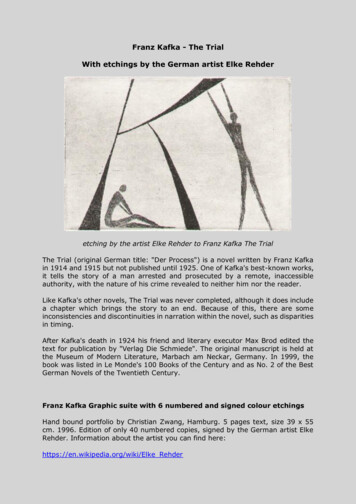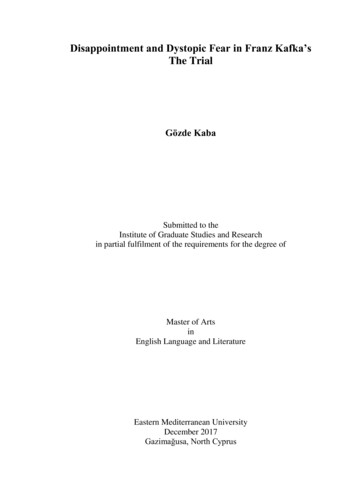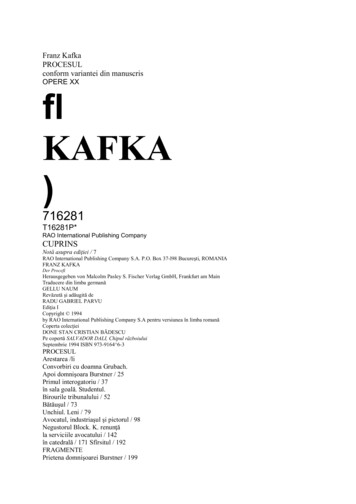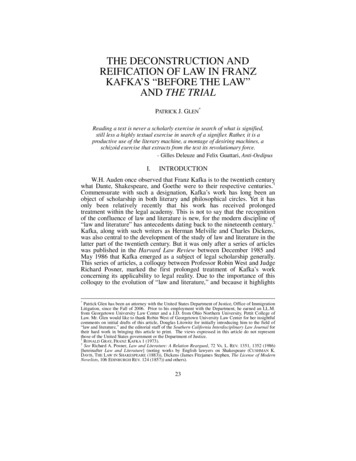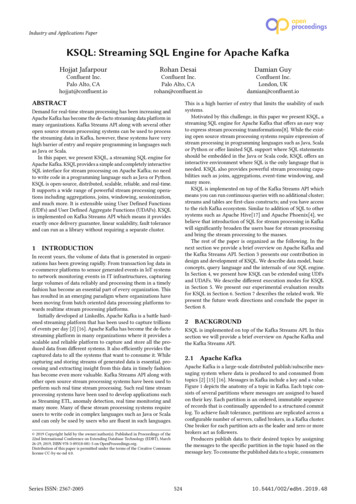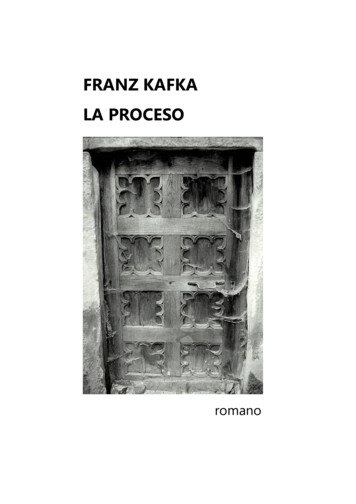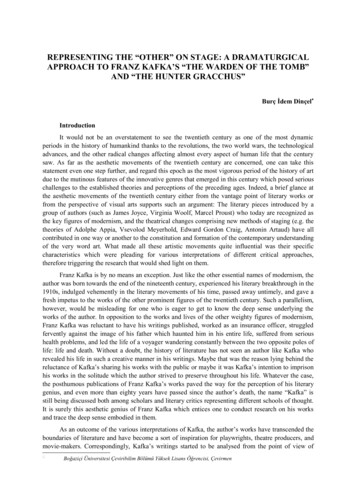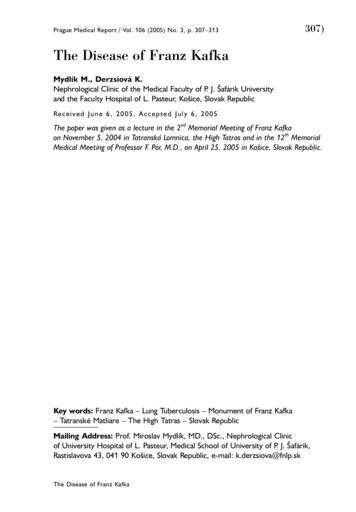
Transcription
Prague Medical Report / Vol. 106 (2005) No. 3, p. 307–313307)The Disease of Franz KafkaMydlík M., Derzsiová K.Nephrological Clinic of the Medical Faculty of P. J. Šafárik Universityand the Faculty Hospital of L. Pasteur, Košice, Slovak RepublicReceived June 6, 2005, Accepted July 6, 2005The paper was given as a lecture in the 2nd Memorial Meeting of Franz Kafkaon November 5, 2004 in Tatranská Lomnica, the High Tatras and in the 12th MemorialMedical Meeting of Professor F. Pór, M.D., on April 25, 2005 in Košice, Slovak Republic.Key words: Franz Kafka – Lung Tuberculosis – Monument of Franz Kafka– Tatranské Matliare – The High Tatras – Slovak RepublicMailing Address: Prof. Miroslav Mydlík, MD., DSc., Nephrological Clinicof University Hospital of L. Pasteur, Medical School of University of P. J. Šafárik,Rastislavova 43, 041 90 Košice, Slovak Republic, e-mail: k.derzsiova@fnlp.skThe Disease of Franz Kafka
308)Prague Medical Report / Vol. 106 (2005) No. 3, p. 307–313Abstract: On June 3, 2004, 80 years have passed since the death of one of thegreatest and the most important world writers of 20th century, the Prague Germanwriter Franz Kafka. On November 5, 2004 we reminded that remarkableanniversary, which was also the 3rd anniversary of revelation of the monument ofFranz Kafka in Tatranské Matliare, the High Tatras. Franz Kafka suffered from lungtuberculosis from 1917 until his death 1924. He was treated on lung tuberculosisin the sanatorium “Villa Tatra“ from December 20, 1920 until August 27, 1921 inTatranské Matliare, the High Tatras. Lung tuberculosis was a very dangerousdisease in that time and the treatment by dietotherapy, climatotherapy andsymptomatic therapy without antituberculotic drugs was less effective in manypatients. In the paper the disease of Franz Kafka was described according toavailable literature.On June 3, 2004, 80 years have passed since the death of one of the worldgreatest and the most influential writers of the beginning of the twentieth century,the Prague German writer Franz Kafka [1, 2, 3]. Apart of this, on May 16, 2004three years have passed from the revealing of Franz Kafka’s monument inTatranské Matliare, the High Tatras. Franz Kafka is the author of three novels –Not Heard (America), (1912), The Trial (1914), The Castle (1922), the author ofmany short stories (Transformation, Verdict, A Country Doctor, A Hunger Artist,Description of a Fight and others), the author of letters devoted to his relativesFigure 1 – The monument of Franz Kafka in Tatranské Matliare, the High Tatras.Mydlík M., Derzsiová K.
Prague Medical Report / Vol. 106 (2005) No. 3, p. 307–313309)and friends (the best known are letters to Milena Jesenská), aphorisms and otherliterary texts including his own diary. With Franz Kafka’s personality the PragueGerman literature reached its artistic peak. It reflected complicated cultural andsocial situation of that time as well as author’s own fantastic, fearful, inquiring andirreproducible depiction of world vision. Franz Kafka’s literary work is nowadaysunderstood as an urgent and desperate warning against the dehumanized worldand belongs to the everlasting values of the world literature.Authors of this paper being also the main initiators of building and revealingFranz Kafka’s monument in Tatranské Matliare, as well as initiators of the FirstMemorial Meeting of Franz Kafka in Tatranské Matliare in 2001 (Figure 1), [4, 5],decided to organize the Second Memorial Meeting of Franz Kafka in the sameplace on the occasion of about mentioned anniversaries (Figure 2).The first part of the 2nd Memorial Meeting of Franz Kafka took place onNovember 5, 2004 at his monument in Tatranské Matliare. A lot of importantpersonalities participated – among them RNDr. M. Mališová, Head of Franz Kafka’sCentre in Prague, Ing. M. Šturcel from “Štátne lesy” of Tatra’s National Park inTatranská Lomnica, Professor A. Jenča, MD., PhD., Dean of the Medical Facultyof P. J. Šafárik University in Košice. In the opening part of the Memorial MeetingA. Jurečková from the Municipal Authorities in Starý Smokovec, the High Tatraspresented the prose of Franz Kafka “An Unexpected Walk”. On closing of the firstpart of 2nd Memorial Meeting of Franz Kafka, Lucia Vaníčková, studentFigure 2 – The programme of the 2nd MemorialMeeting of Franz Kafka, which was heldin Tatranské Matliare and Tatranská Lomnicaon November 5, 2004.The Disease of Franz Kafka
310)Prague Medical Report / Vol. 106 (2005) No. 3, p. 307–313of the 5th grade of State Conservatorium in Košice, performed a composition forthe violin from the second score d-mol “Sarabanda Guige” by J. S. Bach (Figure 3).The second part of 2nd Memorial Meeting of Franz Kafka continued in theInformation Centre of “Štátne lesy” Tatra’s National Park in Tatranská Lomnica.After the opening speech of Professor M. Mydlík, MD., DSc., the programmeproceeded further by the speech of Ing. M. Šturcel, representative of “Štátne lesy”Tatra’s National Park, who welcomed the guests and participants. In the followingtwo lectures JUDr. J. Gašpar, director of the State Scientific Library in Košice, hada speech on the history of Tatranské Matliare and simultaneously he presentedthe history showing some historical pictures on the posters including the stay ofFranz Kafka in Tatranské Matliare. Mag. Ľ. Rusnáková from library in Popraddescribed the relationship between Franz Kafka and Max Brod during his stay inthe High Tatras.The programme continued with lecture by Professor M. Mydlík, MD., DSc., andIng. K. Derzsiová from the Nephrological Clinic of the Medical Faculty of P. J. ŠafárikUniversity and Faculty Hospital of L. Pasteur in Košice. The paper dealt with FranzKafka’s disease, which to some extent influenced his literary work (Figure 4), [6].From 1917 until his death Franz Kafka suffered from lung tuberculosis, butdespite this, he continued in writing intermittently till the end of his life.Tuberculosis was at that time a disease that was hard to cure withoutFigure 3 – The view on the first part of the 2nd Memorial Meeting of Franz Kafka, which was heldon November 5, 2004 in Tatranské Matliare.Mydlík M., Derzsiová K.
Prague Medical Report / Vol. 106 (2005) No. 3, p. 307–313311)contemporary possibilities to use antituberculotic drugs. His disease wasmanifested by haemoptoe during the night from 12th to 13th August 1917 in his flatin Schönborn Palace in Prague-Malá Strana. Haemoptoe has been repeated onthe following night [1].In the following years Franz Kafka underwent some therapeutic stays in variousvillages and sanatoriums (Siřem, Turnov and Želízy in Czechoslovakia and Meranoin Italy). From December 20, 1920 to August 27, 1921 Franz Kafka was treated inthe sanatorium “Villa Tatra” in Tatranské Matliare, the High Tatras (Figure 5).It was his longest stay during his relatively short but very active life that he spentoutside Prague [1].It was known till nowadays that Franz Kafka has written only one text “AusMatlárháza” during his stay in Tatranské Matliare. The text was published in thejournal “Karpathen-Post” 42, 1921, No. 17, p. 1 about exhibition of the amateurwater-colour painter Antonín Holub. Jiří Stromšík, one of the members of editorialstaff of Kafka’s collected works, translated the fragment and the prose of FranzKafka “Writing is denied” and “Away from here”. According to J. Stromšík thesetexts were written by Franz Kafka in February 1921 that means during his stay inTatranské Matliare. The texts were published in the third volume of Kafka’scollected works: Short stories III (The Married Couple and other texts frominheritance) pp. 102–104, the Work of Franz Kafka, Vol. III, Kafka’s PublishingFigure 4 – The view on the second part of the 2nd Memorial Meeting of Franz Kafka, which was held onNovember 5, 2004 in Information Centre of “Štátne lesy” Tatra’s National Park in Tatranská Lomnica,the High Tatras.The Disease of Franz Kafka
312)Prague Medical Report / Vol. 106 (2005) No. 3, p. 307–313house, Prague 2003, 363 pp. Apart from these literary texts Franz Kafka wrotea lot of letters from Tatranské Matliare: Letters to his sisters Elli, Valli and Ottla(12 letters), to his brother-in-law David, to his friend Max Brod (18 letters) and toMinza Eisner (3 letters), [ 7, 8].Max Brod was his best and closest friend, author of his curriculum vitae andpostmortal publisher of his work. He sent him a questionnaire to TatranskéMatliare concerning his state of health. Franz Kafka answered the questionnaire insuch a way: weight increased? 8 kg; total weight? 65 kg; objective pulmonaryfindings? secret of physician, supposedly good; fever? mostly without fever;breathing? was not good, especially during the cold winter months; signature:the only question, that embarrassed and confused Franz Kafka [9]. During his stayin Tatranské Matliare Franz Kafka suffered from total weakness and lack ofappetite. Moreover, he had got increased temperature and suffered from irritativeand productive cough and he overcame pneumonia during his stay in the HighTatras. In Tatranské Matliare Franz Kafka was treated according to the standardsof that time: bed rest during the day, lying on the balcony as a method ofclimatotherapy. He was on a diet with a large amount of milk, he took antipyreticdrugs, codeine and other symptomatic drugs and in this way, the physicians triedto reduce symptoms of lung tuberculosis [10]. During his stay in Tatranské MatliareFranz Kafka got acquainted with another patient, Robert Klopstock, who was astudent of medicine and who became his friend.After Franz Kafka left Tatranské Matliare his health status did not changesignificantly so he proceeded in curative stays in the spas: Špindlerův Mlýn, Planán/Lužnicí and in German spa Müritz near the Baltic sea. In the spa Müritz FranzKafka met Dora Diamant who became his life partner during his stay in Berlinin 1923, and she was also present at his death-bed together with RobertKlopstock, MD.In March 1924 Robert Klopstock, MD., found out loss of the voice in the patientFranz Kafka and in April 1924 at the Otorhinolaryngological Clinic of ProfessorHajek in the General Hospital in Vienna (Austria), this was professionally judged aslaryngophthisis. Franz Kafka was moved with progressive lung tuberculosis andlaryngophthisis from the Otorhinolaryngological Clinic in Vienna to Hoffmann’sFigure 5 – Sanatorium “Villa Tatra”,in which Franz Kafka was treated on lungtuberculosis from December 20, 1920to August 27, 1921 in Tatranské Matliare.Mydlík M., Derzsiová K.
Prague Medical Report / Vol. 106 (2005) No. 3, p. 307–313313)MD., sanatorium in Kierling, today it is a part of Klosterneuburg not far fromVienna, where he died among his friends on June 3, 1924.The last short story written by Franz Kafka in Prague, in the period from March19 to April 4, 1924, was “Singer Josephine – or – a mouse nation”, and probablymarked with his developed laryngophthisis. The funeral of Franz Kafka was held atthe Jewish Cemetery in Prague-Strašnice, on June 11, 1924.Second Memorial Meeting of Franz Kafka was organized in closed cooperationwith Municipal Authorities in Starý Smokovec and “Štátne lesy” Tatra’s NationalPark in Tatranská Lomnica on the occasion of the 80 th anniversary of Franz Kafka’sdeath and third anniversary of revealing of the monument for this remarkablepersonality of the world literature in Tatranské Matliare. The celebration was heldin the festive atmosphere. This ceremony showed that the cultural public in theHigh Tatras and the whole region of Eastern Slovakia honoured the memory ofFranz Kafka.References1. WAGENBACH K.: Franz Kafka . Second edit., Prague 1993, 179 pp. (in Czech).2. BROD M.: Franz Kafka, Biography. First edit., Odeon, Prague 1966, 290 pp. (in Czech).3. BROD M.: Franz Kafka, Biography. Second edit. Publishing House of Franz Kafka, Prague 2000, 228 pp.(in Czech).4. MIŠKUFOVÁ H.: Franz Kafka in the High Tatras. Česká Beseda 7: 9, 2001. (in Slovak).5. MYDLÍK M., DERZSIOVÁ K.: Franz Kafka in Tatranské Matliare. Vnitř. Lék. 48: 60–61, 2001. (in Slovak).6. MYDLÍK M.: II nd Memorial Meeting of Franz Kafka in Matliare. Tatry 2: 31, 2005. (in Slovak).7. KAFKA F.: Letters to Ottla and Family. Aurora, Prague 1966, 166 pp. (in Czech).8. KAFKA F.: Tatra’s Letters. Selection from correspodence 1920/1921. Tatra’s Library, Poprad 1997,54 pp. (in Slovak).9. KAFKA F. & BROD M.: Friendship, Correspodence. First edit. Hynek, Prague 1998, 453 pp. (in Czech).10 . THOMAYER J.: Pathology and Therapy of Internal Diseases. Fifth edit. Bursík & Kohout, Prague 1923,1085 pp. (in Czech).The Disease of Franz Kafka
Franz Kafka got acquainted with another patient, Robert Klopstock, who was a student of medicine and who became his friend. After Franz Kafka left Tatranské Matliare his health status did not change significantly so he proceeded in curative stays in the spas: Špindlerův Mlýn, Planá n/Lužnicí and in German spa Müritz near the Baltic sea.
